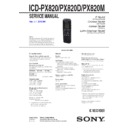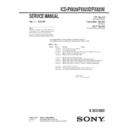Read Sony ICD-PX820 / ICD-PX820D / ICD-PX820M Service Manual online
SERVICE MANUAL
Sony Corporation
Audio&Video Business Group
Published by Sony Techno Create Corporation
ICD-PX820/PX820D/PX820M
SPECIFICATIONS
IC RECORDER
9-889-754-02
2010D04-1
©
2010.04
E Model
ICD-PX820/PX820M
Chinese Model
ICD-PX820M
Korean Model
ICD-PX820
Latin American Model
ICD-PX820/PX820D/PX820M
Ver. 1.1 2010.04
IC recorder section
Capacity (User available capacity)
2 GB (approx. 1.8 GB =1,929,622,016 Byte)
A part of the memory capacity is used as a
management area.
2 GB (approx. 1.8 GB =1,929,622,016 Byte)
A part of the memory capacity is used as a
management area.
Recording time
Maximum recording time
The maximum recording time of all the folders
is as follows.
The maximum recording time of all the folders
is as follows.
SHQ mode
HQ mode
SP mode
22 hr. 15 min. 33 hr. 25 min. 89 hr. 15 min.
LP mode
535 hr. 55 min.
535 hr. 55 min.
(hr. : hours/min. : minutes)
Frequency range
• SHQ : 75 Hz - 20,000 Hz
• HQ : 75 Hz - 17,000 Hz
• SP : 75 Hz - 15,000 Hz
• LP : 80 Hz - 3,500 Hz
• SHQ : 75 Hz - 20,000 Hz
• HQ : 75 Hz - 17,000 Hz
• SP : 75 Hz - 15,000 Hz
• LP : 80 Hz - 3,500 Hz
Bit rate and sampling frequency
for MP3 fi les*
for MP3 fi les*
1
• SHQ : 44.1 kHz, 192 kbps
• HQ : 44.1 kHz, 128 kbps
• SP : 44.1 kHz, 48 kbps
• LP : 11.025 kHz, 8 kbps
• HQ : 44.1 kHz, 128 kbps
• SP : 44.1 kHz, 48 kbps
• LP : 11.025 kHz, 8 kbps
Bit rate: 32 - 320 kbps, VBR
Sampling frequencies:
16/22.05/24/32/44.1/48
Sampling frequencies:
16/22.05/24/32/44.1/48
kHz
*
1
The playback of MP3 fi les recorded using
the IC recorder is also supported.
Not all encoders are supported.
General
Speaker
Approx. 28 mm (1
Approx. 28 mm (1
1/8
in.) dia.
Input/Output
• Microphone jack (minijack, stereo)
– input for plug in power, minimum input
level 0.5 mV, 3 kilohms or lower impedance
microphone
• Headphone jack (minijack, stereo)
– output for 8 - 300 ohms headphones
• USB connector
– High-Speed USB compatible
• Microphone jack (minijack, stereo)
– input for plug in power, minimum input
level 0.5 mV, 3 kilohms or lower impedance
microphone
• Headphone jack (minijack, stereo)
– output for 8 - 300 ohms headphones
• USB connector
– High-Speed USB compatible
Playback speed control (DPC)
+100% to –50%
+100% to –50%
Power output
300 mW
300 mW
Power requirements
Two LR03 (size AAA) alkaline batteries
(supplied): 3.0 V DC
Two NH-AAA rechargeable batteries (not
supplied): 2.4 V DC
Two LR03 (size AAA) alkaline batteries
(supplied): 3.0 V DC
Two NH-AAA rechargeable batteries (not
supplied): 2.4 V DC
Operating temperature
5˚C - 35˚C (41˚F - 95˚F)
5˚C - 35˚C (41˚F - 95˚F)
Dimensions (w/h/d) (not incl.
projecting parts and controls) (JEITA)*
projecting parts and controls) (JEITA)*
2
37 × 111 × 21.2 mm (1
1/2
× 4
3/8
×
27/32
in.)
Mass (JEITA)*
2
Approx. 71 g (2
1/2
oz) including LR03 (size
AAA) alkaline batteries
*
2
Measured value by the standard of JEITA
(Japan Electronics and Information
Technology
Industries
Association)
Supplied accessories
IC Recorder (1)
LR03 (size AAA) alkaline batteries (2)
USB connecting cable (1)
Application Software, Digital Voice Editor
(CD-ROM)
Application Software, Dragon
NaturallySpeaking® (DVD-ROM)*
Stereo headphones* (1)
Carrying pouch* (1)
Stereo microphone with shift-clip* (1)
Operating Instructions
IC Recorder (1)
LR03 (size AAA) alkaline batteries (2)
USB connecting cable (1)
Application Software, Digital Voice Editor
(CD-ROM)
Application Software, Dragon
NaturallySpeaking® (DVD-ROM)*
Stereo headphones* (1)
Carrying pouch* (1)
Stereo microphone with shift-clip* (1)
Operating Instructions
* The some of the software, stereo headphones,
carrying pouch and stereo microphone with
shift-clip are supplied with some models in
some regions only.
carrying pouch and stereo microphone with
shift-clip are supplied with some models in
some regions only.
Design and specifi cations are subject to
change without notice.
change without notice.
Note:
Be sure to keep your PC used for service and
checking of this unit always updated with the
latest version of your anti-virus software.
In case a virus affected unit was found during
service, contact your Service Headquarters.
Be sure to keep your PC used for service and
checking of this unit always updated with the
latest version of your anti-virus software.
In case a virus affected unit was found during
service, contact your Service Headquarters.
ICD-PX820/PX820D/PX820M
2
1. DISASSEMBLY
1-1. Disassembly Flow ........................................................... 3
1-2. Battery Case Lid ............................................................. 3
1-3. Case (Front) Assy, Speaker (SP101) ............................... 4
1-4. Complete Main Board ..................................................... 5
1-5. Liquid Crystal Display Panel (LCD101), Main Board ... 5
1-2. Battery Case Lid ............................................................. 3
1-3. Case (Front) Assy, Speaker (SP101) ............................... 4
1-4. Complete Main Board ..................................................... 5
1-5. Liquid Crystal Display Panel (LCD101), Main Board ... 5
2.
TEST MODE
............................................................ 6
3. DIAGRAMS
3-1. Block
Diagram
................................................................ 11
3-2. Printed Wiring Board –Main Section (1/2)– ................... 12
3-3. Printed Wiring Board –Main Section (2/2)– ................... 13
3-4. Schematic Diagram –Main Section (1/5)– ...................... 14
3-5. Schematic Diagram –Main Section (2/5)– ...................... 15
3-6. Schematic Diagram –Main Section (3/5)– ...................... 16
3-7. Schematic Diagram –Main Section (4/5)– ...................... 17
3-8. Schematic Diagram –Main Section (5/5)– ...................... 18
3-3. Printed Wiring Board –Main Section (2/2)– ................... 13
3-4. Schematic Diagram –Main Section (1/5)– ...................... 14
3-5. Schematic Diagram –Main Section (2/5)– ...................... 15
3-6. Schematic Diagram –Main Section (3/5)– ...................... 16
3-7. Schematic Diagram –Main Section (4/5)– ...................... 17
3-8. Schematic Diagram –Main Section (5/5)– ...................... 18
4.
EXPLODED VIEWS
4-1. Case (Front) Section ....................................................... 28
4-2. Case (Rear) Section ........................................................ 29
4-2. Case (Rear) Section ........................................................ 29
5.
ELECTRICAL PARTS LIST
.............................. 30
Accessories are given in the last of the electrical parts list.
TABLE OF CONTENTS
UNLEADED SOLDER
Boards requiring use of unleaded solder are printed with the lead-
free mark (LF) indicating the solder contains no lead.
(Caution: Some printed circuit boards may not come printed with
Boards requiring use of unleaded solder are printed with the lead-
free mark (LF) indicating the solder contains no lead.
(Caution: Some printed circuit boards may not come printed with
the lead free mark due to their particular size)
: LEAD FREE MARK
Unleaded solder has the following characteristics.
• Unleaded solder melts at a temperature about 40 °C higher
• Unleaded solder melts at a temperature about 40 °C higher
than ordinary solder.
Ordinary soldering irons can be used but the iron tip has to be
applied to the solder joint for a slightly longer time.
applied to the solder joint for a slightly longer time.
Soldering irons using a temperature regulator should be set to
about 350 °C.
Caution: The printed pattern (copper foil) may peel away if
about 350 °C.
Caution: The printed pattern (copper foil) may peel away if
the heated tip is applied for too long, so be careful!
• Strong
viscosity
Unleaded solder is more viscous (sticky, less prone to fl ow)
than ordinary solder so use caution not to let solder bridges
occur such as on IC pins, etc.
than ordinary solder so use caution not to let solder bridges
occur such as on IC pins, etc.
• Usable with ordinary solder
It is best to use only unleaded solder but unleaded solder may
also be added to ordinary solder.
also be added to ordinary solder.
NOTES ON CHIP COMPONENT REPLACEMENT
• Never reuse a disconnected chip component.
• Notice that the minus side of a tantalum capacitor may be dam-
• Never reuse a disconnected chip component.
• Notice that the minus side of a tantalum capacitor may be dam-
aged by heat.
FLEXIBLE CIRCUIT BOARD REPAIRING
• Keep the temperature of soldering iron around 270 °C during
• Keep the temperature of soldering iron around 270 °C during
repairing.
• Do not touch the soldering iron on the same conductor of the
circuit board (within 3 times).
• Be careful not to apply force on the conductor when soldering
or unsoldering.
ICD-PX820/PX820D/PX820M
3
SECTION 1
DISASSEMBLY
Note: Follow the disassembly procedure in the numerical order given.
1-2. BATTERY CASE LID
• This set can be disassembled in the order shown below.
1-1. DISASSEMBLY FLOW
1-2. BATTERY CASE LID
(Page
(Page
3)
1-3. CASE
(FRONT)
ASSY,
SPEAKER
(SP101)
(Page
4)
SET
1-4. COMPLETE MAIN BOARD
(Page
(Page
5)
1-5. LIQUID CRYSTAL DISPLAY PANEL (LCD101),
MAIN
MAIN
BOARD
(Page
5)
1 claw
2 claw
3 battery case lid
ICD-PX820/PX820D/PX820M
4
1-3. CASE (FRONT) ASSY, SPEAKER (SP101)
2 two screws
7 two screws
8 bracket (speaker)
9 bracket (speaker)
red
black
0 Remove the two solders.
qa speaker (SP101)
3 two claws
4 two claws
5 two claws
6 case (front) assy
case (front) assy
1 tapping screw


